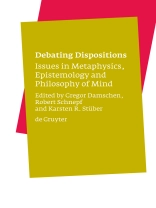Ordinary language and scientific discourse are filled with linguistic expressions for dispositional properties such as “soluble, ” “elastic, ” “reliable, ” and “humorous.” We characterize objects in all domains – physical objects as well as human persons – with the help of dispositional expressions. Hence, the concept of a disposition has historically and systematically played a central role in different areas of philosophy ranging from metaphysics to ethics.
The contributions of this volume analyze the ancient foundations of the discussion about disposition, examine the problem of disposition within the context of the foundation of modern science, and analyze this dispute up to the 20th century. Furthermore, articles explore the contemporary theories of dispositions.
Innehållsförteckning
I. The Discovery of Dispositions: Ancient Foundations
Francisco Gonzalez; Ludger Jansen; Burkhard Meißner
II. The Debate about Dispositions from the Beginning of Modern Science until the 20th Century
Dennis Des Chene; Michael-Thomas Liske; Peter Machamer; Ursula Renz; Oliver Scholz
III. Contemporary Theories
Elke Brendel; Gregor Damschen; David Henderson / Terry Horgan; Andreas Hüttemann; Jennifer Mc Kitrick; Stephen Mumford; Robert Schnepf; Markus Schrenk; Karsten R. Stüber
Om författaren
Gregor Damschen, University of Luzern, Switzerland, and Martin-Luther-Universität Halle-Wittenberg, Germany; Robert Schnepf , Martin-Luther-Universität Halle-Wittenberg, Germany; Karsten R. Stüber, College of the Holy Cross, Worcester, MA, USA.












